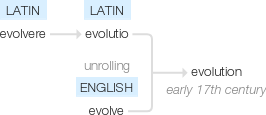Evolution
early 17th century: from Latin evolutio(n- ) ‘unrolling’, from the verb evolvere (see evolve). Early senses related to movement, first recorded in describing a ‘wheeling’ manoeuvre in the realignment of troops or ships. Current senses stem from a notion of ‘opening out’, giving rise to the sense ‘development’.
wiktionary
Borrowed from Latin ēvolūtiō, ēvolūtiōnis(“the act of unrolling, unfolding or opening (of a book)”), from ēvolūtus, perfect passive participle of ēvolvō(“unroll, unfold”), from ex + volvō(“roll”).
etymonline
evolution (n.)
1620s, "an opening of what was rolled up," from Latin evolutionem (nominative evolutio) "unrolling (of a book)," noun of action from past participle stem of evolvere "to unroll" (see evolve).
Used in medicine, mathematics, and general writing in various senses including "growth to maturity and development of an individual living thing" (1660s). Modern use in biology, of species, first attested 1832 in works of Scottish geologist Charles Lyell. Charles Darwin used the word in print once only, in the closing paragraph of "The Origin of Species" (1859), and preferred descent with modification, in part because evolution already had been used in the discarded 18c. homunculus theory of embryological development (first proposed under this name by Bonnet, 1762) and in part because it carried a sense of "progress" not present in Darwin's idea. But Victorian belief in progress prevailed (and the advantages of brevity), and Herbert Spencer and other biologists after Darwin popularized evolution.
